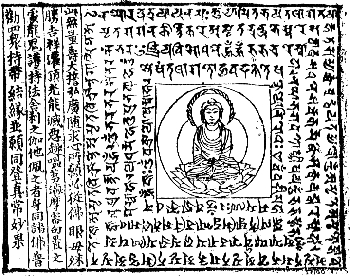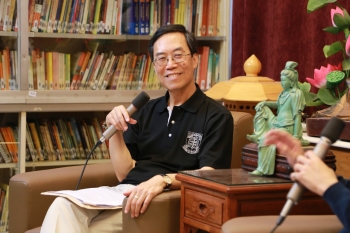In this series of “Two Buddhas, Two Teachings”, we have discussed at length Master Shandao’s Commentary on the Contemplation Sutra. In this text, he wrote of two paths: the Path of Importance expounded by Shakyamuni Buddha, and the Path of Great Vow by Amitabha Buddha with his alternative intent. We’ve explored the many differences between the two paths, and now we shall examine the differences in achievement or reward.
Generally speaking, the final achievement or reward in the two teachings is the same because both of them can lead us to rebirth in the Land of Bliss, which is the goal of all Pure Land practitioners. However, the rebirth in the two paths is different because they are based on two different vows made by Amitabha Buddha.
Rebirth under the 19th vow in the Path of Importance
For those who follow the Path of Importance, dedication and aspiration is the most important method for the sake of rebirth in the Pure Land, as indicated by Master Shandao. However, it should be noted that they begin as Buddhists, set upon the path already. They start with the awakened aspiration for the Supreme Enlightenment in pursuit of wisdom and virtues, or the Bodhi Mind in the pursuit of Buddhahood, followed by the practice of meditative virtues and non-meditative virtues. Through cultivation by their own effort, they intend to liberate themselves and even other sentient beings from the cycle of birth and death.
The self-motivated practitioners study the Four Noble Truths, Twelve Links of Dependent Origination, and practice meditation in order to attain Arhatship step by step. Some of them may follow the orthodox Mahayana path by learning the Bodhisattva teachings, setting forth the Four Great Vows, and practicing the Six Paramitas with a myriad of virtues and Four Immeasurable Minds. All this aims at achieving all 52 stages of Bodhisattvahood before Buddhahood itself. These are practitioners who awaken aspiration for the Supreme Enlightenment.
They focus on purifying their mind and body. They attempt to clear different kinds of delusions and obstructions. All of them intend to perform diligently various meritorious deeds and attain assorted virtues by self-effort in both meditative practices (basically the Three Studies, Precepts, Meditation and Wisdom) and non-meditative practices (the Three Virtues, Human and Heavenly Virtues, Arhat Virtues and Bodhisattva Virtues).
They believe in the theory of karma and the principle of causal conditions, because these are the universal truths in the Saha Land as taught by Shakyamuni Buddha. They start their cultivation from the causal ground as ordinary beings and finish at the reward ground as Arhats or Bodhisattvas.
However, some practitioners may want to take a faster approach. Upon hearing the name of Amitabha Buddha and his Land of Bliss, they decide to switch to Amitabha’s teaching and follow the Path of Importance. They aspire to be reborn in the Land of Bliss, so as to liberate themselves from rebirth within the Six Realms.
By taking the Path of Importance, they dedicate the merits and virtues attained through the meditative and non-meditative practices in the Saha Land, and sincerely aspire to be reborn in the Pure Land, so as to continue and expedite their pursuit to be Arhats or Bodhisattvas under the guidance and support of Amitabha Buddha.
In this process, the practitioner takes his own initiative, without any direct involvement and intervention by Amitabha Buddha. The situation is exactly the same as described in the 19th vow of Amitabha Buddha. It states:If, when I attain Buddhahood, sentient beings in the lands of the ten directions, who set forth the Bodhi Mind, do various meritorious deeds and sincerely aspire to be born in my land, should not, at their death, see me appear before them surrounded by a multitude of sages, may I not attain perfect Enlightenment.
Sentient beings have to set forth the Bodhi Mind first (aspiration), then do various meritorious deeds next (practice), followed by a sincere aspiration to be reborn in the Land of Bliss (faith). The sequence of the Three Sambhara (aspiration, practice and faith) is very important. Aspiration is the motive. Self-initiative, self-effort and self-motivation, self-power play a dominant role in this path, from the awakened aspiration to the Supreme Enlightenment to the wholehearted and sincere aspiration to be reborn in the Land of Bliss.
Though Pure Land Buddhism is regarded as the Easy Path, the Path of Importance is comparatively difficult for achieving rebirth in the Land of Bliss. The self-motivation and self-power of an ordinary being is involved, yet it is not ‘reliable.’ For instance, if the practitioner is vigorous in his cultivation, his confidence to be reborn in the Land of Bliss is higher. However, if the practitioner retrogresses or loses his Bodhi Mind, or slackens in his meditative and non-meditative practices, he will worry and doubt whether he can be reborn in the Land of Bliss. As a result, the chance of rebirth is uncertain because of anxiety and doubt. His rebirth depends on his confidence, while his confidence depends on his persistence of the Bodhi Mind, and the consistency of his effort in cultivation.
Actually, Amitabha Buddha does not set any minimum requirement in his 19th vow in terms of the merits and virtues attained by the practitioner. He is ready at any time to receive anyone who sincerely aspires to be reborn and dedicates all the merits and virtues attained in the meditative and non-meditative practices.
It is up to the practitioner’s discretion to determine when the most appropriate time is to have Amitabha Buddha involved for the assurance of his rebirth. Generally, it would not happen in the practitioner’s present life because he keeps working hard on his meditative and non-meditative virtues. It is near the end of the practitioner’s life, and when his spirit begins to leave his body, that he will cease his Bodhisattva practices and dedicate all his merits and virtues to other sentient beings as he has no alternative.
Reaching the weakest point of his life, he is unlikely to control or resist the inconceivable karma accumulated in his past lives that may drag him back to the Six Realms, unless he has become a sage, such as an Arhat or a 7th-stage Bodhisattva.
At this critical moment, if the practitioner sincerely hopes to be reborn in the Land of Bliss without further doubt and hesitation, he must be mindful to call upon Amitabha Buddha to appear and pacify his mind without confusion and receive him. Amitabha Buddha promises in his 19th vow that he will come and appear before the practitioner near the point of his death upon the request of the practitioner. This is the result of the Pure Land practitioners who take the Path of Importance, and it is known as ‘the rebirth assured near death’.
For a practitioner in the Path of Importance, his rebirth in the Land of Bliss is uncertain (not completely assured) in the present, and may be assured only at the near-end of his life. Moreover, the state of retrogression cannot be achieved in this life, but can only in the next life in the Land of Bliss. The Path of Importance is only applicable to those Buddhists who hear this path in the present life.
Rebirth under the 18th vow in the Path of Great Vow
The situation is different in the Path of Great Vow. Upon hearing the teaching of Amitabha Buddha, a person firstly sincerely and joyfully entrusts himself to Amitabha Buddha’s salvation (faith), secondly aspires to be reborn in the Land of Bliss (aspiration) and lastly recites exclusively Amitabha’s name (practice) until the end of his life. The sequence of the Three Sambhara in this case is faith, aspiration and practice.
The situation is clearly stated in the 18th vow: “If, when I achieve Buddhahood, sentient beings of the ten directions who sincerely and joyfully entrust themselves to me, wish to be reborn in my land and recite my name, even ten times, should fail to be born there, may I not attain perfect enlightenment. Excepted are those who commit the five gravest transgressions or slander the correct Dharma.”
Based on faith, the practitioner relies entirely on other-power (Amitabha Buddha’s power) to save him from the rebirth in samsara, and also to receive him to be reborn in the Land of Bliss. He does not perform any other meritorious deeds, but recites Amitabha’s name exclusively till the end of his life, in accordance with the Fundamental Vow of Amitabha Buddha.
The practitioner’s target is rebirth in the Pure Land. By reciting exclusively Amitabha’s name, the practitioner will automatically be embraced by the omnipresent light of Amitabha Buddha, which consists of the unsurpassed splendid merits and virtues he attained for dedicating to all Amitabha-reciters.
The practitioner might not even be a Buddhist. He can hear and accept Amitabha’s teaching in the present life, or even at his deathbed. The Path of Great Vow is applicable to all sentient beings in different capacities under any circumstance. It does not matter whether he is sacred or ordinary, good or evil, householder or monastic, capable or incapable of practicing meritorious deeds, wise or foolish. So long as he recites exclusively Amitabha’s name, he will definitely be reborn in the Land of Bliss. Why? It is because Amitabha Buddha has accomplished his Fundamental Vow.
Master Shandao said, “Today Amitabha is before us, having achieved Buddhahood. We should know that his Fundamental Vow has been unequivocally fulfilled.” Amitabha’s Fundamental Vow and his power is substantive and weighty because he has achieved Buddhahood for 10 kalpas.
Whenever a person establishes his faith firmly and aspires single-mindedly to be reborn in the Land of Bliss during his present life, or even at the near end of his life, his rebirth in the Land of Bliss is assured. It is because Amitabha Buddha will intervene right at that moment. Amitabha Buddha will clear all obstacles that may hinder him from being reborn in the Land of Bliss, including the karmic force that may drag him to reincarnation within the Six Realms.
Amitabha Buddha will, by all means, take care of the matters related to the rebirth of the practitioner. Amitabha Buddha will also take his own initiative to come and appear automatically before the practitioner near the end of his life, provided he is mindful of Amitabha Buddha. Prior invitation or emergency calls from the practitioner is not necessary at this ‘critical’ moment. Why? Again, it is because Amitabha Buddha has accomplished his Fundamental Vow, and will never fail to receive Amitabha-reciters with faith and aspiration.
As long as we have no doubt about Amitabha’s deliverance and salvation, no further change in our wish to be reborn in the Land of Bliss, and just keep reciting Amitabha Buddha exclusively for the rest of our lives, we are assured to be received by Amitabha Buddha, and be reborn in his Paradise. It is known as ‘rebirth assured in the present life’ under the 18thvow of Amitabha Buddha.
That is why Master Shandao said, “If sentient beings recite his name, they will certainly be reborn in the Land of Bliss.” We would no longer be ordinary beings undergoing reincarnation in the Six Realms, but members of the Pure Land’s sacred assembly. Though our lives haven’t ended and we are still suffering in the Six Realms, we are destined not to sink again as we have already boarded the ship of Amitabha’s great Vow. The whole matter of our rebirth was already been undertaken by Amitabha Buddha at the time our faith was firmly established. It is known as ‘non-retrogression in this life’.
As Master Yinguang said, “If our minds are firmly set on liberation from life and death, and we can believe [in this teaching] without a shred of doubt, though we still live in this Saha world, we are long-term residents no more. Though we haven’t yet been born in the Land of Bliss, we are already its guests.”
How so? The answer lies in the statement in the 18th vow: should fail to be born there, may I not attain perfect enlightenment. ‘I’ refers to Amitabha Buddha. Whether we can be reborn or not depends on Amitabha Buddha, through our faith. It does not depend on us, our aspiration in Supreme Enlightenment (the Bodhi Mind), or our practices in assorted merits and virtues. This is the main difference between the 18th vow and the 19th vow.
No other self-power practices in the Three Studies, no meditative and non-meditative practices and no dedication of merits and virtues are mentioned and specified in Amitabha’s 18th vow. There is no need to add any unnecessary requirement in the 18th vow. A person is merely required to recite Amitabha’s name exclusively and single-mindedly in accordance with the Fundamental Vow. Amitabha’s name consists of the splendid, unsurpassed and substantial merits and virtues, which fulfills all necessary requirements to allow us to be reborn in the Land of Bliss, the realm of unconditioned nirvana. Amitabha’s name is actually the Dharma body of Amitabha Buddha. It is Amitabha Buddha who takes the initiative and makes the effort to ensure rebirth in the entire process.
Faith, based on the 18th vow, plays a dominant role in this path. It is the faith that trusts in the deliverance of Amitabha Buddha, which is developed through the exclusive practice of Amitabha-recitation. It is called the ‘karma of assurance’ by Master Shandao. Karma of Assurance means rebirth in the Land of Bliss is assured. If our rebirth depends on Amitabha Buddha, it must be 100% assured because Amitabha Buddha has accomplished his Fundamental Vow and has the full capacity to allow us to be reborn in the Land of Bliss.

















